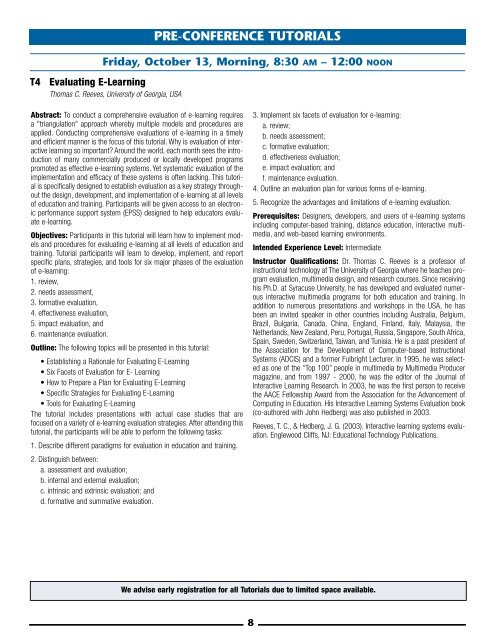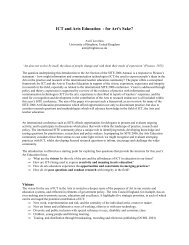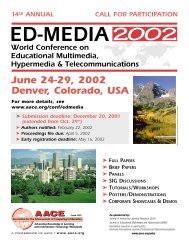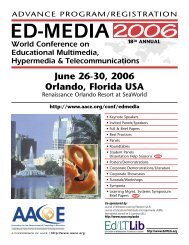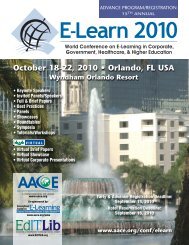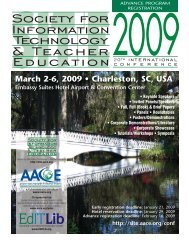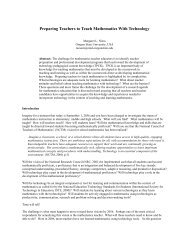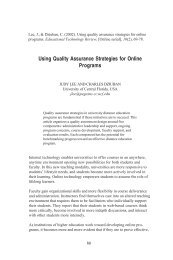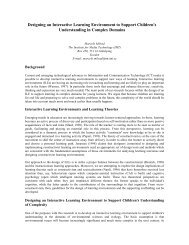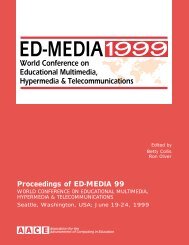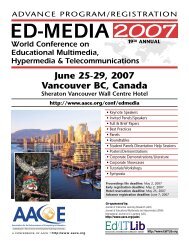October 13-17, 2006 Honolulu, Hawaii USA - Association for the ...
October 13-17, 2006 Honolulu, Hawaii USA - Association for the ...
October 13-17, 2006 Honolulu, Hawaii USA - Association for the ...
Create successful ePaper yourself
Turn your PDF publications into a flip-book with our unique Google optimized e-Paper software.
PRE-CONFERENCE TUTORIALSFriday, <strong>October</strong> <strong>13</strong>, Morning, 8:30 AM – 12:00 NOONT4Evaluating E-LearningThomas C. Reeves, University of Georgia, <strong>USA</strong>Abstract: To conduct a comprehensive evaluation of e-learning requiresa "triangulation" approach whereby multiple models and procedures areapplied. Conducting comprehensive evaluations of e-learning in a timelyand efficient manner is <strong>the</strong> focus of this tutorial. Why is evaluation of interactivelearning so important? Around <strong>the</strong> world, each month sees <strong>the</strong> introductionof many commercially produced or locally developed programspromoted as effective e-learning systems. Yet systematic evaluation of <strong>the</strong>implementation and efficacy of <strong>the</strong>se systems is often lacking. This tutorialis specifically designed to establish evaluation as a key strategy throughout<strong>the</strong> design, development, and implementation of e-learning at all levelsof education and training. Participants will be given access to an electronicper<strong>for</strong>mance support system (EPSS) designed to help educators evaluatee-learning.Objectives: Participants in this tutorial will learn how to implement modelsand procedures <strong>for</strong> evaluating e-learning at all levels of education andtraining. Tutorial participants will learn to develop, implement, and reportspecific plans, strategies, and tools <strong>for</strong> six major phases of <strong>the</strong> evaluationof e-learning:1. review,2. needs assessment,3. <strong>for</strong>mative evaluation,4. effectiveness evaluation,5. impact evaluation, and6. maintenance evaluation.Outline: The following topics will be presented in this tutorial:• Establishing a Rationale <strong>for</strong> Evaluating E-Learning• Six Facets of Evaluation <strong>for</strong> E- Learning• How to Prepare a Plan <strong>for</strong> Evaluating E-Learning• Specific Strategies <strong>for</strong> Evaluating E-Learning• Tools <strong>for</strong> Evaluating E-LearningThe tutorial includes presentations with actual case studies that arefocused on a variety of e-learning evaluation strategies. After attending thistutorial, <strong>the</strong> participants will be able to per<strong>for</strong>m <strong>the</strong> following tasks:1. Describe different paradigms <strong>for</strong> evaluation in education and training.2. Distinguish between:a. assessment and evaluation;b. internal and external evaluation;c. intrinsic and extrinsic evaluation; andd. <strong>for</strong>mative and summative evaluation.3. Implement six facets of evaluation <strong>for</strong> e-learning:a. review;b. needs assessment;c. <strong>for</strong>mative evaluation;d. effectiveness evaluation;e. impact evaluation; andf. maintenance evaluation.4. Outline an evaluation plan <strong>for</strong> various <strong>for</strong>ms of e-learning.5. Recognize <strong>the</strong> advantages and limitations of e-learning evaluation.Prerequisites: Designers, developers, and users of e-learning systemsincluding computer-based training, distance education, interactive multimedia,and web-based learning environments.Intended Experience Level: IntermediateInstructor Qualifications: Dr. Thomas C. Reeves is a professor ofinstructional technology at The University of Georgia where he teaches programevaluation, multimedia design, and research courses. Since receivinghis Ph.D. at Syracuse University, he has developed and evaluated numerousinteractive multimedia programs <strong>for</strong> both education and training. Inaddition to numerous presentations and workshops in <strong>the</strong> <strong>USA</strong>, he hasbeen an invited speaker in o<strong>the</strong>r countries including Australia, Belgium,Brazil, Bulgaria, Canada, China, England, Finland, Italy, Malaysia, <strong>the</strong>Ne<strong>the</strong>rlands, New Zealand, Peru, Portugal, Russia, Singapore, South Africa,Spain, Sweden, Switzerland, Taiwan, and Tunisia. He is a past president of<strong>the</strong> <strong>Association</strong> <strong>for</strong> <strong>the</strong> Development of Computer-based InstructionalSystems (ADCIS) and a <strong>for</strong>mer Fulbright Lecturer. In 1995, he was selectedas one of <strong>the</strong> “Top 100” people in multimedia by Multimedia Producermagazine, and from 1997 - 2000, he was <strong>the</strong> editor of <strong>the</strong> Journal ofInteractive Learning Research. In 2003, he was <strong>the</strong> first person to receive<strong>the</strong> AACE Fellowship Award from <strong>the</strong> <strong>Association</strong> <strong>for</strong> <strong>the</strong> Advancement ofComputing in Education. His Interactive Learning Systems Evaluation book(co-authored with John Hedberg) was also published in 2003.Reeves, T. C., & Hedberg, J. G. (2003). Interactive learning systems evaluation.Englewood Cliffs, NJ: Educational Technology Publications.We advise early registration <strong>for</strong> all Tutorials due to limited space available.8


